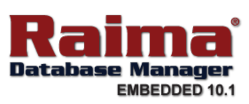Seattle, WA (PRWEB) September 07, 2011
Raima, known worldwide for providing high performance embedded database products, today announced the general availability release of RDM Embedded 10.1.
This release builds on the highly efficient multicore architecture introduced in RDM Embedded 10 and introduces multiple new APIs designed to meet clients demands for more programing interface options, increased ease of use and shorter development cycles.
Building on the success of RDMe 10.0 we have added new comprehensive and compact SQL API as well as a standard based ODBC API and an intuitive C++ API. This combined with the new hash indexing method will meet the need for increased efficiency and speed,” says Paul Johnson, Director of Product Management and Marketing.
RDM Embedded 10.1:
New Comprehensive SQL API
RDM Embedded’s new SQL API is lightweight and compact yet powerful enough to provide robust SQL functionality. The implementation of SQL provides an inclusive subset of the ANSI/ISO standard SQL that is ideally suited for a wide variety of computers and devices running standard and embedded operating systems. By using RDM Embedded’s SQL API developers can easily create embedded applications utilizing Raima’s high performance database engine.
New Standards Based ODBC API
Raima developed the ODBC API to provide developers, already familiar with the ODBC standard interfaces, an industry standard way to utilize the power of the RDM Embedded database engine.
New Intuitive C++
With RDM Embeddeds new C++ API, developers can now use the familiar object model to create data intensive embedded applications. The C++ API was designed with ease of use as its primary requirement while still providing developers with full access and control to both RDM Embeddeds network and relational functionality. The result is a very powerful interface that can easily be used to create high-performing and efficient databases and applications in the C++ programming language.
Faster data access provided by Hash indexes
To meet the increasing demand and complexity in handling data, Raima has in this version of RDM Embedded implemented hash indexes that allows for the developers to create hash indexed tables which can provide a substantial increase in performance. Using hashing on large volumes often yields better performance than b-tree indexing methods.
RDM Embedded 10.1 Introduction video available on YouTube.
Download packages of the RDM Embedded 10.1 SDKs are available at http://www.raima.com/downloads.
About Raima Inc.
Raima Inc. is a premier provider of high-performance embedded database, data management, and dataflow solutions known as the Raima Database Manager (RDM) product-line. Raima have been powering real-time data management software to time critical industries and real time enterprises with Raima products since 1982. Raima brings a proven track record to a wide variety of markets like Aerospace & Defense, Telecom, Financial, Consumer Electronics, Medical, Industrial Automation, and Business Automation. Raima released the first version of the Raima embedded database in 1984. RDM Embedded pioneered the embedded market space under the name dbVista. Building on the success of RDM Embedded, Raima released the product in a client/server configuration that is now called RDM Server.
Raima, RDM, RDM Embedded, RDM Server, and DataFlow are trademarks, registered trademarks or service marks of Raima, Inc.

